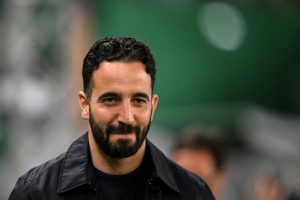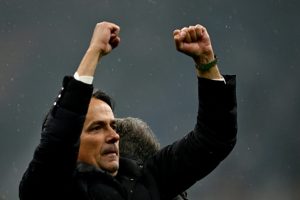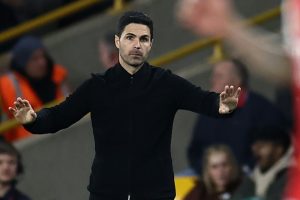
There will be a reunion at the start of September. The pair who combined for the only Champions League-winning goal – penalty shootouts excluded – in Chelsea’s history will be together again. But not for a Chelsea game. When Kai Havertz, the 2021 scorer, and Mason Mount, his supplier, are due to share a pitch again, it is because Arsenal are hosting Manchester United.
The pace of change at Stamford Bridge is so swift that, barely two years after Thomas Tuchel’s team triumphed in Porto, only three of the 14 men to take the field that day – Thiago Silva, Ben Chilwell and Reece James – are set to be at Chelsea next season. Todd Boehly and Clearlake Capital can argue that the first of the departures, those of Antonio Rudiger and Andreas Christensen, in effect predated their arrival, but not the rest. Chelsea now seem to exist in a state of permanent revolution.
If Mount’s exit ought to provide Chelsea with most grounds for regret – Havertz, in contrast, spent three seasons as an enigma – United’s new No. 7 reflects a third phenomenon at Stamford Bridge. If Barcelona spent the summer of 2022 pulling various levers to permit them to trade, Mount is part of Boehly’s third lever.
The first two have the air of loopholes; or, at the least, unique circumstances. Part one was based on amortisation over extraordinarily long contracts, thus allowing them to spread the fees – in their accounts, anyway – over much of the next decade. It is a loophole Uefa are closing but Enzo Fernandez, Mykhailo Mudryk and Nicolas Jackson have deals until 2031, Benoit Badiashile, Malo Gusto, Noni Madueke and Andrey Santos contracts until 2030 and Wesley Fofana, David Datro Fofana and Christopher Nkunku are tied down until 2029. Ridiculously, Chelsea have 17 players whose deals last at least another five seasons.
Part two of the masterplan involved selling to Saudi Arabia. Perhaps Boehly, the man who acted as though he was cleverer than everyone else for much of a year of rampant stupidity, deserves credit for recognising and capitalising on a new market when some of Chelsea’s rivals are struggling to dispose of unwanted players. Kalidou Koulibaly, Edouard Mendy and, albeit on a free transfer, N’Golo Kante have gone to a newly wealthy league; Hakim Ziyech and Romelu Lukaku could follow and, if Chelsea have their way, perhaps Pierre-Emerick Aubameyang will, too.
Kalidou Koulibaly is one of a number of Chelsea players making the move to the Saudi Pro League (PA)
But the third phase of the Boehly blueprint has entailed selling off the family silver. Letting Ruben Loftus-Cheek join AC Milan was understandable; Chelsea can lament what might have been if a huge talent had stayed fit but, at 27, he had only made 155 appearances for them. But Mount was different: Chelsea’s player of the year in two of the last three campaigns – a lazy trope he has had two bad campaigns shows ignorance – and a footballer who, along with Fernandez, James and Chilwell, looked among the best suited of their squad to Mauricio Pochettino’s demands, he should have been a Stamford Bridge lifer; maybe a future captain, possibly ending up with 500 or 600 appearances to his name.
And yet over the last year Chelsea contrived to hire three managers and 18 players – plus bidding for dozens of others – and give several of their existing squad new deals without managing to extend Mount’s contract. It should have been one of the top priorities for the new regime; it did not feel that way and, while Chelsea can claim they had to sell the midfielder to prevent him from leaving on a free transfer, it has the air of a situation they created themselves. His sale was an indictment of their powerbrokers.
They may deem it a triumph of negotiating, though, after forcing United to pay more than they wanted to. At an initial £55m, Mount has brought in one of the five biggest fees Chelsea have ever received. But from an accounting perspective, the key element is that it counts as “pure profit” in the books; sales of the homegrown are especially useful in that respect, particularly for a club who may face issues in their attempts to pass Financial Fair Play. It may point to the departures of Callum Hudson-Odoi and Ethan Ampadu, who arguably need moves, but also to those who do not: perhaps Trevoh Chalobah or Conor Gallagher or Armando Broja. It may be telling that Chelsea tried to send Gallagher to Everton in January.
Mason Mount is now a Manchester United player (PA Wire)
Remove the word “pure” and the profit part is still rare. Chelsea sold Mendy at a loss, two years after he was named the best goalkeeper in the world. They sold Koulibaly for half the amount they paid last summer. The £65m they recouped for Havertz may be more than anticipated, but it was still less than his purchase price. Mateo Kovacic only had a year left on his deal and is 29 but he, too, went for a smaller sum than he arrived for. Lukaku, Ziyech and Christian Pulisic, if they go, will bring in under half of a combined cost of almost £200m. That is certainly not all the fault of Boehly and Clearlake: in several cases, their fortunes were declining before the takeover though the chaos of the last year has often compounded that. Being displaced by dozens of new signings can deplete value still further, while Koulibaly and Aubameyang can now be written off as bad buys.
And Boehly and Chelsea are trying to fund their trading – or at least negotiate Financial Fair Play – by flogging anything and anyone they inherited. They have surpassed many an expectation by bringing in around £200m already this summer. There may well be another half a dozen players leaving, perhaps swelling the sum towards £300m.
But Chelsea’s outlay already stands at the best part of £700m in little over a year. Whether it leaves them with a stronger squad than in 2021 is a moot point: after all, they have gone from being Champions League winners to out of Europe altogether. But by the end of this transfer window, Boehly’s third lever may have exhausted its use. Chelsea might be running out of players to sell.
And at some point, they may have to call upon a fourth prong: a distinctly old-fashioned one called trading well. It may involve seeking value for money when buying, rather than repeatedly paying way over the odds, and selling some of their signings for a profit. It could entail keeping players for several years, rather than having a revolving door. It may sound crazy to Boehly and co but Chelsea might have to try it.






